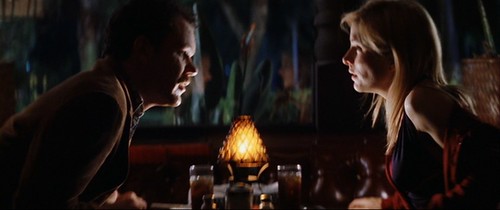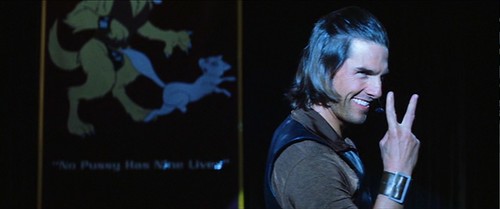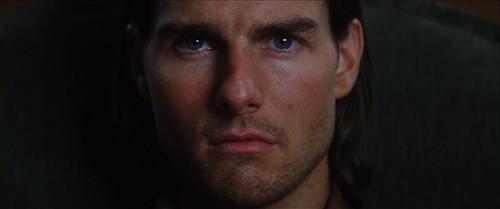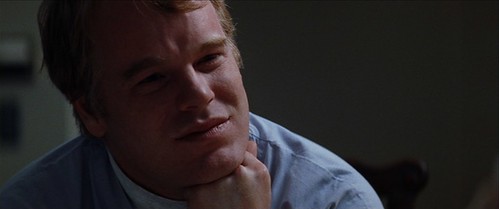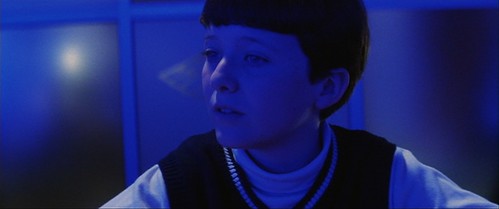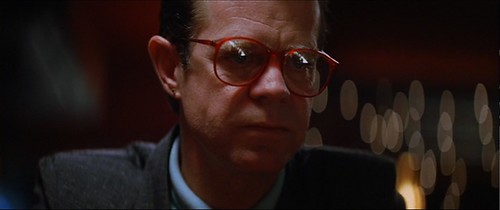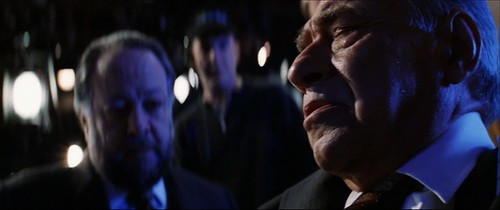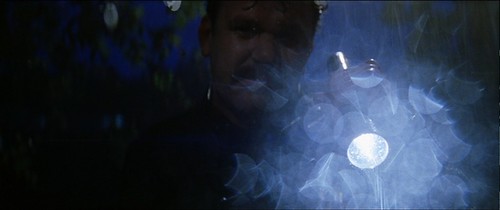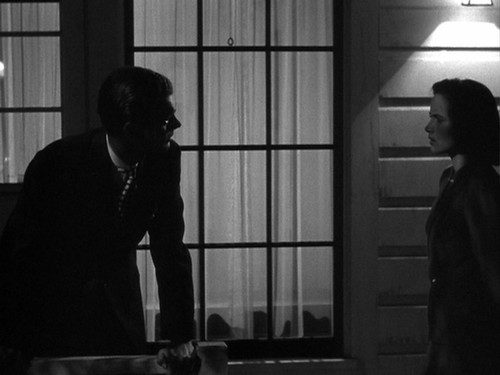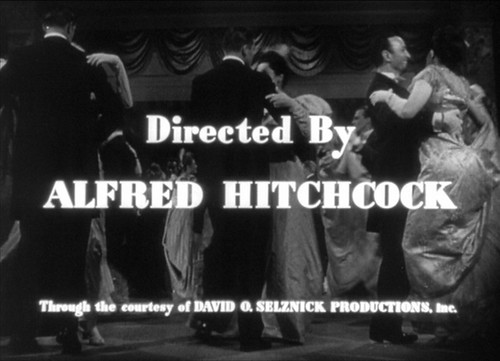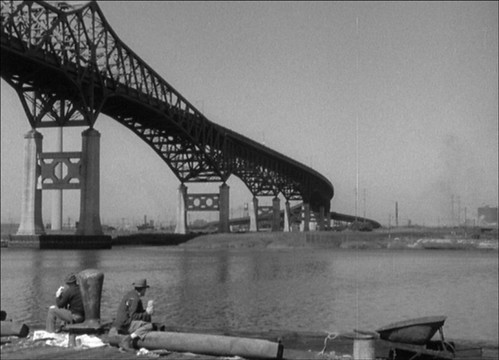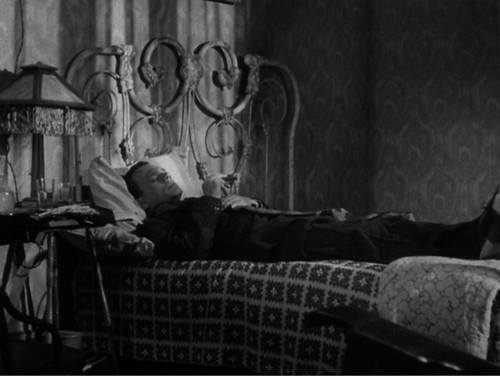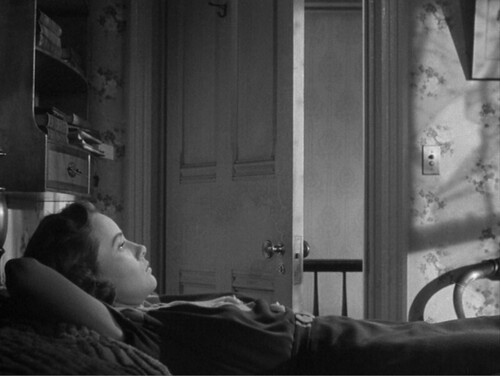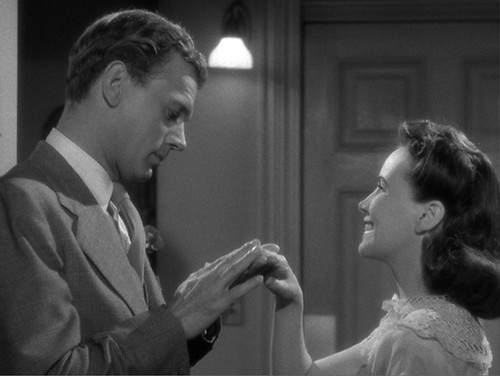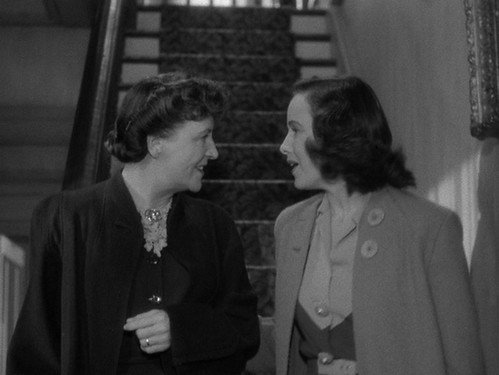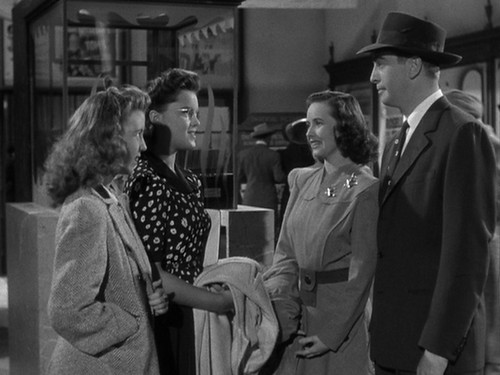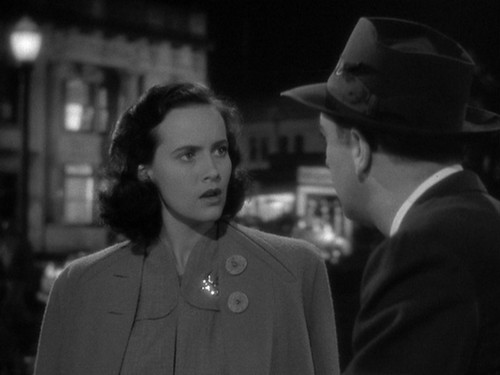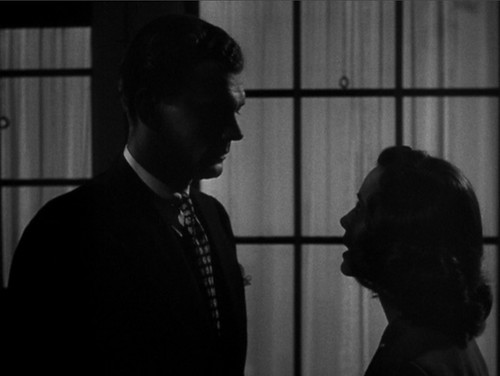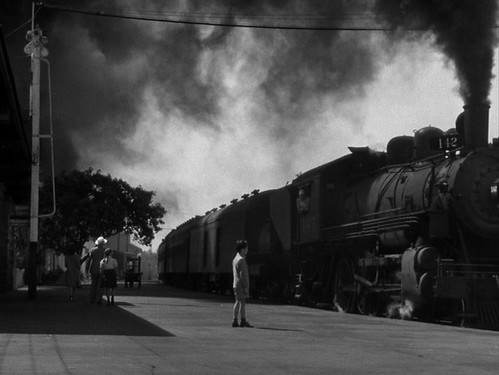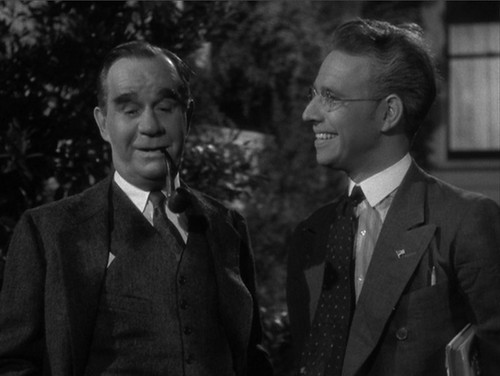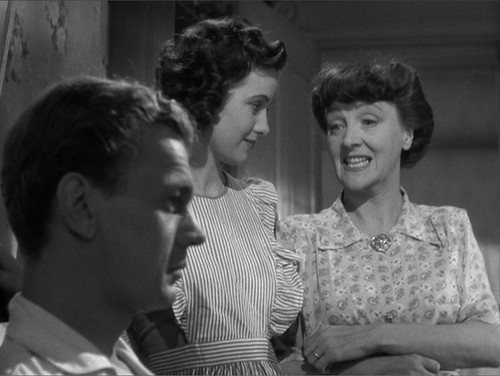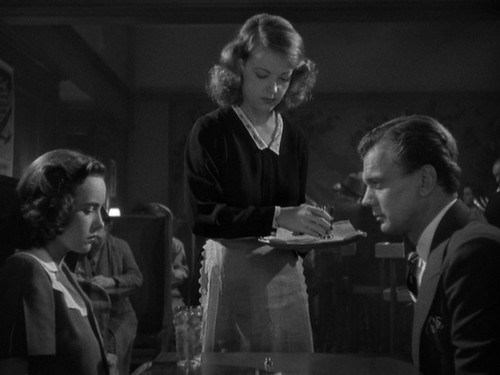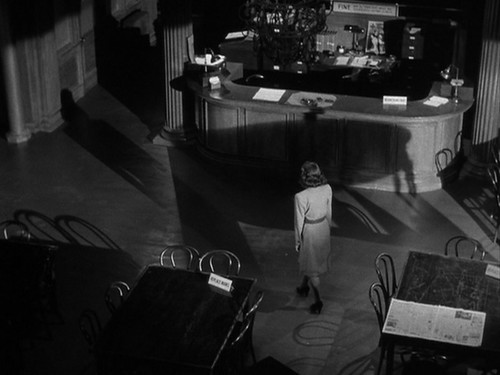spoilers.
director: paul thomas anderson
screenplay: paul thomas anderson
starring: jeremy blackman, tom cruise, melinda dillon, philip baker hall, philip seymour hoffman, ricky jay, william h. macy, alfred molina, julianne moore, john c. reilly, jason robards, and melora walters.
from the 2000 new line platinum series release.
Given my admiration for Short Cuts and Nashville, Paul Thomas Anderson's magnolia naturally appeals to me. Admittedly, I'm not a big fan of ensemble movies, and maybe half of the ones I like are directed by Robert Altman. I find the worst ones try to force in too many connections, and the result becomes a game trying to find out how their lives intersect, or worse yet, the film makes sweeping generalizations about these people (I'm looking at you, Paul Haggis!). Unlike Short Cuts, which I feel focuses more on social interactions, magnolia feels more intimate, more about seeing these characters' fortitude stripped away to reveal their humanity, their flaws, and their pain. Part of this may be the shooting style. Short Cuts almost never uses a close-up, while magnolia is filled with them.
Everyone's someone's son or daughter
The interplay between parents and children is a very relatable issue for me (and for most I would imagine). magnolia understands that the love between parents and children often fades, disintegrates, or just drifts apart. The lives in magnolia are insular and vary in mode of protection, whether it be Stanley and his books, Frank and his hyper-masculinity, or Claudia and drugs. Regardless, the universal thread is loneliness borne out of social pressures as well as familial ones. Ensemble movies seem ideal for showing people who, out of pain, wrap themselves in a cocoon. Another one would be the other Anderson's The Royal Tenenbaums.
Frank's "Seduce and Destroy" program, admittedly, is extremely funny, but also filled with meaning. Roger Ebert brings up the question: Why does Frank hate women if his father was the one who abandoned him? I think this kind of misses the point. Frank's display of hypermasculinity isn't something that we can attribute to what's on screen, per se. I suspect that, after he had to take care of and lose his mother, Frank may have felt a need to compensate for the lack of a father figure. That he lashes out at women does not mean he hates them... it's a product of his masculinity. It's not too hard to imagine social pressures influencing his final behavior. But the movie doesn't give us answers, and the point is not to give conclusions to life (which is what the interviewer foolishly wants).
Another way of looking at it is that Frank is a man who wants control. His "Seduce and Destroy" program has all kinds of booklets, chapters, and mottos, which seems to be an attempt to garner control over something, anything really. In this case it happens to be trying to bed women. This desire for control undoubtedly stems from Frank's helplessness when tending to his dying mother. Yet, his claims for the "Seduce and Destroy" program are merely a coverup, and especially after the interview, you can see that powerlessness and frustration surface. The reporter has managed to strike a chord, and broken his persona. He has just heard his father is dying and who, no matter how much Frank may resent him, is still his father. As much as Frank hates to admit it, he knows he will regret it if he doesn't see his father before he dies.
Regret, I think, is a huge part of magnolia. The bizarre raining frogs is a revelation, and while there's a biblical reference, I prefer to pare down the explanation to something more universal. I see the frogs as a wake-up call, jilting people out of their stupors to make them realize what's really valuable as well as make them see that they are passing up a great opportunity to do the right thing. It's as if the universe is slapping Jim in the face, telling him: Are you going to pass up a chance to help yourself and a woman who needs your support? Or telling Claudia and her mother: Come on, the same blood flows in your veins; don't let yourselves drift apart. Or telling Frank: Regardless of past resentments, he's your father and he's dying; it's really that simple. Or telling Donnie: You're not a kid anymore, grow up and take responsibility. Or telling Stanley: No, you don't have to have the answer to everything. I think the earthquake in Short Cuts has a similar purpose.
Performances
I think magnolia has some really raw performances, and Philip Seymour Hoffman I found really likable here. His Phil allows himself to connect emotionally with Earl, a dying man who he has only known by profession. I can't say I found his character particularly profound, but it's nice to see compassion in someone's job. Plus, if you don't find him both loving and funny at the same time, I don't know what to tell you.
I'd say magnolia's the best I've seen Tom Cruise, in the way he allows facade to be torn down. On a side note: I'm not too thrilled with the constant Cruise-bashing that goes on. It's ridiculous that a star like that has to be slated by the media and the public, at the cost of his talent. People love to drag stars through the mud, as if it elevates them. Just leave them alone, admire their work, and only their work. Simple.
Other than Cruise, who I think really peels back his persona to reveal how conflicted he is, I really admire Julianne Moore, who plays a smaller part than I would have liked.
Moore said she's best playing the more reserved roles, where she underplays emotion. I'd posit that when her emotions flood over her, as they do often in magnolia, it's to her strength and it's quite compelling. She has the same helplessness that Frank had. She knows she can't do anything except ease the pain (which in and of itself is difficult), and she finds herself unable to control her own emotions. I see the same thing with Frank. When he's by his father's bedside, you can see this inner turmoil erupt. He is torn between love and resentment, and the helplessness he had over his mother is returning with his father. Moreover, he knows that all those years can't be recaptured. This is the best he can do.
Regret
This regret plays out in virtually all the characters, and it's seen in Earl's astonishing monologue. What magnolia does at several points is to quickly cut to every major character, frequently to draw a thread through all of them and bring an emotional connection that binds them together. When Earl is lamenting about the overwhelming regret, saying over and over again: "What did I do? What did I do? What did I do..." we see all the characters. All of them are at a crossroads, where if they take the easier road, they will regret it the rest of their lives.
Grow Up
For me, the most apparent dichotomy in the movie is between Quiz Kid Donnie Smith and Stanley. While there's the implication that they share similar fates, it's never quite hit over the head. If anything, I would think they have divergent paths, since Stanley is the one who breaks free from the zoo of conventions the adults have set up. His position is something that, I'm sure, everybody can identify with on some level. Even if it's not a parent, there are always social pressures forcing us into roles we may not want. When I see Stanley wet his pants, it's incredibly visceral... you can feel his embarrassment, probably because it's something we've all felt at some point. magnolia is so good at making us understand and care what these characters feel, maybe because it taps into very identifiable dilemmas. Exposure is something dealt with over and over in the movie, and real life for that matter.
Stanley confronts his father, telling him he needs to be nicer, but as in life, there are never any definite answers or conclusions. Thankfully, the movie wisely sidesteps giving us a definitive answer to life.
It's important, regardless of consequence, that Stanley spoke out against the adults because it's the action that has signified his maturation, which is something that Donnie Smith seems to lack. Stanley's failure to reach Quiz Kid Donnie Smith's record has, in fact, allowed him to mature. Donnie, by comparison, is childish and believes that a silly thing like braces will help Brad fall in love with him. He's caught in a perpetually pre-adolescent phase in which he believes reciprocation of love is created through silly middle school notions.
William H. Macy has a tricky role to play, since he kind of has to be a sideshow. It would be very easy to dismiss him, but I feel his character is perhaps the most tragic of them all. Donnie is a product of adults parading their children around like freaks. That shot of him in the pitiful little kitchen with his giant check, light of his life, hanging on the wall, makes his whole life seem empty and wasted. His pleas for attention at the bar, like talking about getting struck by lightning, are pitiful and remind me of the kind of thing people did in middle school when they had a school crush.
I think Donnie isn't a hopeless figure, per se, but it is kind of disheartening that a man his age would still act like a child. I think Stanley and Donnie, by the end, have matured and come to realize that life doesn't have easy answers. Stanley finds that he doesn't have to know or explain everything, nor will he find it easy to change his father. Donnie learns that getting the man he loves isn't as simple as getting braces or inspiring pity, but is sometimes impossible.
What Do Kids/We Know?
Jimmy Gator, the host of "What Do Kids Know?" and shining influence, good or bad, on Donnie and Stanley's lives, has an interesting part that I almost ignored the first time I saw magnolia. Interestingly, when I first saw him, I immediately thought of Network. His performance seems to have a little Peter Finch in it, but maybe more William Holden. Funny enough, the features on the disc show PTA screening Network, so I guess he was successful in channeling that.
The connection between him and Earl is something I completely missed the first go around, but now seems all too clear. It seems Jimmy Gator is an earlier version of Earl. When we hear Earl talking about his regret with never telling his wife Lily that he cheated, we see Jimmy Gator at home, clearly sick and suffering from cancer. His wife lovingly attends to him, and it's not too hard to see Jimmy and Rose as a younger Earl and Lily. In this life, however, Jimmy does admit his adultery, perhaps giving Earl some spiritual closure through the ether.
Rose is understanding of her husband's adultery, but she's enraged that Jimmy could've molested their daughter, Claudia. Jimmy and Earl's relationships with their children are very similar as well. Both estranged, they both have, in their children's eyes, caused great harm. Whether Jimmy did molest Claudia or not is immaterial. What matters is that she thinks so. This has caused their estrangement, and while their circumstances may be different, the film is able to draw another thread between Jimmy and Claudia, and Earl and Frank.
One thing about magnolia is that it's impossible to pigeonhole. It's tragic, but the humor tips the scales back into balance. I don't like the term "drama" because I don't really consider drama to be a genre. It feels like it's the leftover bin everything else is thrown into. Categorizing this sort of movie isn't really that important, and if it's unclassifiable, then so be it.
If magnolia is part tragedy and part comedy, then it's also part romance.
The relationship between Jim and Claudia is necessary, and it is the storyline that marks the beginning and ending of the main bushel of narratives. Hence, it's important to see that, in spite of Jim and Claudia's complete differences, they both need each other. They're like two puzzle pieces, opposite in form but perfect in complement.
When we first see Claudia, she is a mess. She sleeps around, takes an innumerable amount of cocaine, and seems to hide behind her curtains, which always seem to fall down in a blinding epiphany of light. She is, perhaps, the most physically reclusive of the characters, drawn into the apartment that becomes her world. It's both a sanctuary and a prison, and she exists in a stasis.
Jim is equally lonely, with a life consisting of waking up, going to work, then coming back home. He talks to himself, as if trying to affirm his place in the world. He provides Claudia with second chance, and when he asks her out, she accepts, forcibly and almost desperately.
There are redemptions, and if there is a "message" to the film, it may be that. Certainly, the relationship between Claudia and Jim carries that theme, but I don't think it's as simple as redemption alone. Claudia's drug abuse is a reciprocation of what she believes her father did to her, yet again, the film doesn't give us easy answers (if psychoanalysis was the answer, we'd all read Freud instead of questioning movies). But because she thinks that, it makes the drug abuse an attempt at remedying her painful memories. This is, in my mind, no different (or blameworthy) than Linda's desires to remedy her pain (and if she thinks her father did that then, well, that's enough)... it is human to err, even if we're not sure what we've done wrong. I don't think about it as "redemption" so much as consolation by reciprocation... Jim and Claudia are both lonely for different reasons. But what matters is their loneliness, not where it comes from (again, proving that providing answers for everything is beside the point).
magnolia is not solely about parents and children, even if it's a common thread. Moreover, I think it's about the physical and mental insulations we create in an effort to hide from reality and our pain. It's loneliness that resonates strongly with me, and it's something that magnolia nails.
That magnolia does not confine itself to the parent/child drama is ambitious, but in no way pretentious. It never hits anything over the head so much as gives us little winks. The film itself doesn't give us answers but allows us to form our own conclusions, which is why it's a movie that can be seen over and over. It doesn't feel answers are the point, but rather believes that the act of observation is enough. Answers and the much dreaded moral-at-the-end-of-the-story generally feel forced (if a movie had the answer to life's questions, we wouldn't need any more) which is why Slumdog Millionaire as a drama doesn't work (and again, I bring that movie up). The advantage of an ensemble piece is that each character can reach a different conclusion and represent a different facet of life, which magnolia does in spades.
